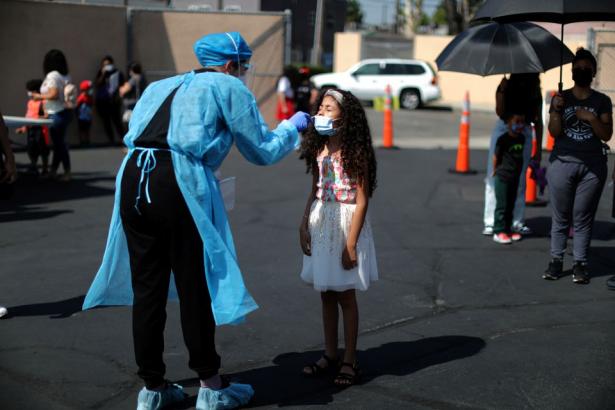The number of children hospitalized with COVID-19 in the United States hit a record high of just over 1,900 on Saturday, as hospitals across the South were stretched to capacity fighting outbreaks caused by the highly transmissible Delta variant.
The Delta variant, which is rapidly spreading among mostly the unvaccinated portion of the U.S. population, has caused hospitalizations to spike in recent weeks, driving up the number of pediatric hospitalizations to 1,902 on Saturday, according to data from the U.S. Department of Health and Human Services.
Children currently make up about 2.4% of the nation's COVID-19 hospitalizations. Kids under 12 are not eligible to receive the vaccine, leaving them more vulnerable to infection from the new, highly transmissible variant.
"This is not last year's COVID. This one is worse and our children are the ones that are going to be affected by it the most," Sally Goza, former president of the American Academy of Pediatrics, told CNN on Saturday.
The numbers of newly hospitalized COVID-19 patients aged 18-29, 30-39 and 40-49 also hit record highs this week, according to data from the U.S. Centers of Disease Control and Prevention (CDC).
The spike in new cases has ramped up tension between conservative state leaders and local districts over whether school children should be required to wear masks as they head back to the classroom this month.
School districts in Florida, Texas and Arizona have mandated that masks be worn in schools, defying orders from their Republican state governors that ban districts from imposing such rules. The administration of Florida Governor Ron DeSantis has threatened to withhold funding from districts that impose mask requirements, and Texas Governor Greg Abbott is appealing to the state Supreme Court to overturn Dallas County's mask mandate, the Dallas Morning News reported on Friday.
A fifth of the nation's COVID-19 hospitalizations are in Florida, where the number of hospitalized COVID-19 patients hit a record 16,100 on Saturday, according to a Reuters tally. More than 90% of the state's intensive care beds are filled, according to data from the Department of Health and Human Services.
INCREASED HOSPITALIZATIONS
The nation's largest teachers union, the National Education Association, came out in support of mandatory vaccination for its members this week. NEA President Becky Pringle said on Saturday that schools should employ every mitigation strategy, from vaccines to masks, to ensure that students can come back to their classrooms safely this school year.
"Our students under 12 can't get vaccinated. It's our responsibility to keep them safe. Keeping them safe means that everyone who can be vaccinated should be vaccinated," Pringle told CNN.
The U.S. now has an average of about 129,000 new COVID-19 cases per day, a rate that has doubled in a little over two weeks, according to a Reuters tally. The number of hospitalized COVID-19 patients is at a six-month high, and an average of 600 people are dying each day of COVID-19, double the death rate seen in late July.
Arkansas, Florida, Louisiana, Mississippi, and Oregon have reported record numbers of COVID-19 hospitalizations this month, according to a Reuters tally, pushing healthcare systems to operate beyond their capacity.
"Our hospitals are working to maximize their available staff and beds, including the use of conference rooms and cafeterias,” Florida Hospital Association President Mary Mayhew said in a statement on Friday.
In Oregon, Governor Kate Brown said on Friday that she was sending 500 National Guard members to assist overwhelmed hospitals, with 1,500 members in total available to help.
In Jackson, Mississippi, federal medical workers are assisting understaffed local teams at a 20-bed triage center in the parking garage of the University of Mississippi Medical Center (UMMC) to accommodate the overflow of COVID-19 patients.
Fifteen children and 99 adults were hospitalized with COVID-19 at UMMC as of Saturday morning, the hospital said. More than 77% of those patients were unvaccinated.
Reporting by Gabriella Borter and Lisa Shumaker; editing by Diane Craft and Aurora Ellis.


Spread the word